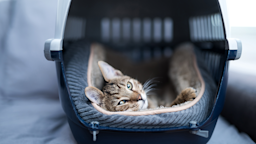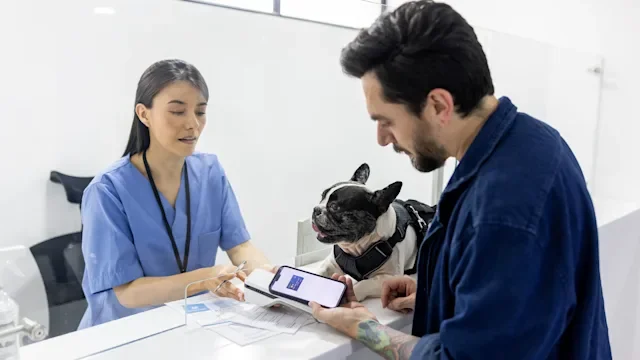Key takeaways:
The unfamiliarity of travel can be stressful to many cats and dogs, whether you’re in the car or in the sky.
Your vet might prescribe one of several medications to help relax your pet during travel.
You can also use several non-medication techniques to help keep your pet relaxed.
Traveling can be a stressful experience for anyone, especially when you’re dealing with traffic or missed flights. For pets, that stress is made worse because of how unfamiliar and strange traveling can be.
You can’t take all of the stress out of a trip. But you can support your pet in multiple ways to help keep them calm while traveling.
Why does traveling make pets anxious?
Many pets get anxious when you travel with them, and multiple factors can affect how your pet copes. Dr. Stephanie Liff, a veterinarian and the owner of Pure Paws Veterinary Care in New York City, explains that some pets do better than others during travel.
Search and compare options
“If travel is extremely rare or out of the ordinary, pets may feel anxiety when traveling by car or plane,” says Liff. “Motion sickness can also exacerbate anxiety associated with travel.”
Veterinarian Dr. Gary Richter, the owner of Holistic Veterinary Care in Oakland, California, agrees that the unfamiliarity of travel causes stress in many pets.
“Dogs are very much creatures of habit and routine, so when you take them out of that routine, that can cause stress or anxiety,” he explains.
The unfamiliar locations and unusual sights and smells associated with car travel can be stressful for pets. They may also have a hard time being in a carrier.
Plane travel can be even more foreign to pets. Richter notes that this is particularly true if pets aren’t flying in the cabin with their owners. The cargo hold can be full of unusual sights, smells, sounds, and even other animals. All of these elements can be stressful for pets.
How to treat the source of pet anxiety
The unfamiliar aspects of a trip are often what causes anxiety in pets. Fortunately, you can help prepare your pet for the trip so the experience isn’t so foreign.
Read more like this
Explore these related articles, suggested for readers like you.
Richter recommends getting your pet used to the carrier long before you go on a trip. You can feed your pet in the carrier. You can also put toys in the carrier to help your pet get used to the space.
“Turn it into a game,” says Richter. “Get your pet really accustomed to the carrier, so when you do have to travel, they’re not super stressed.”
You can also take your pet on short drives around the neighborhood to introduce the motions associated with traveling. Put your pet in the carrier, and go for a quick drive. With future trips, gradually increase the length of the drive.
Richter also recommends putting a bath towel that you’ve used into the bottom of the carrier. “Your smell is on the towel and may give your pet some comfort for the time they’re in the carrier,” he says.
Pet medication to help anxious cats or dogs while traveling
Certain medications may help keep pets calm while traveling. Liff says having a sedative — a type of medication that helps calm your pet — on hand can be helpful.
She recommends gabapentin most often for cats. She often prescribes benzodiazepines (like alprazolam) or trazodone for dogs. “These are typically safe drugs for most pets and can be administered shortly before travel to help ease any anxiety,” says Liff. Your vet might recommend different options.
Medication is not appropriate for all forms of travel. If a pet flies in the cargo hold of a plane, owners should not give them any medication, even calming ones.
“If something happens and there’s nobody there to monitor the pet, things could go wrong,” Richter says.
Sedated pets also can’t regulate their temperatures as well as usual. If the temperature fluctuates in the cargo hold, it could threaten your pet’s health.
Richter recommends that pet owners only give their pets medication with veterinary guidance. Your vet will be able to help you find the best option for your dog or cat.
Can you give a cat or dog Benadryl before traveling?
It may be tempting to give your pet diphenhydramine (Benadryl) before a trip. But it’s important to check with your vet first.
Benadryl can interact with other medications that your pet may be taking. It can also affect any existing health issues. Liff adds that Benadryl can actually cause some cats to become hyperactive. As a result, it’s not the best choice for travel.
Keep in mind that you should never give your dog or cat medication intended for humans. Only give your pet medication specifically designated for animals. Your veterinarian will help you get the right medication for your pet.
Non-medication techniques to manage pet anxiety while traveling
There are also plenty of ways to support your pet that don’t require medication. Liff recommends holistic options like pheromone products. You spray the pheromone scent on your dog’s or cat’s carrier. It can help them stay calm during stressful situations.
Other products may help reduce your pet’s anxiety. For example, your pet might benefit from wearing a thundershirt. A thundershirt is a jacket that provides gentle pressure around your pet’s body. This pressure can help lower anxiety.
You might also consider a thundercap, which goes over your dog’s head. It reduces how much your dog can see so they don’t notice as many new sights. Car shades may also help lower your pet’s anxiety because they can’t see as much at once.
Richter says that CBD and other types of stress- and anxiety-related natural supplements can help some pets. But regardless of what you’d like to try, test it long before travel day.
“I strongly recommend trying out whatever it is that you want to give your pet ahead of time,” Richter advises. “You don’t want to find out on the day that you’re traveling that your dog is having some sort of unusual or unexpected reaction to something that you gave them.”
Give your pet a dose of the supplement while you’re home. See what effect it has, and make sure your pet doesn’t have an unwanted reaction. If you find that the supplement doesn’t work, you may need to increase the dose or try something different.
The bottom line
Travel can be stressful for pets. But there are many ways that you can reduce your pet’s anxiety during a trip. Preparing for your trip well in advance will give you time to get your pet more comfortable with being in a carrier or crate. You can support your pet with natural products like pheromones and holistic supplements. You may also want to talk to your vet about having calming medication on hand in case your pet needs it.

Why trust our experts?



References
Brooks, W. (2021). Diphenhydramine (Benadryl, Vetadryl, Banophen, Diphenhist). Veterinary Partner.
Calder, C. (2021). Car ride anxiety in dogs and cats. Veterinary Partner.
Hunter, T., et al. (n.d.). Flying with your dog in the airplane cabin. VCA Hospitals.
Landsberg, G. (2019). Medicate fear of travel and veterinary visit. Veterinary Information Network.
Liff, S. (2021). Pure Paws Veterinary Care of Hell’s Kitchen. [interview].
Richter, G. (2021). Holistic Veterinary Care. [interview].















